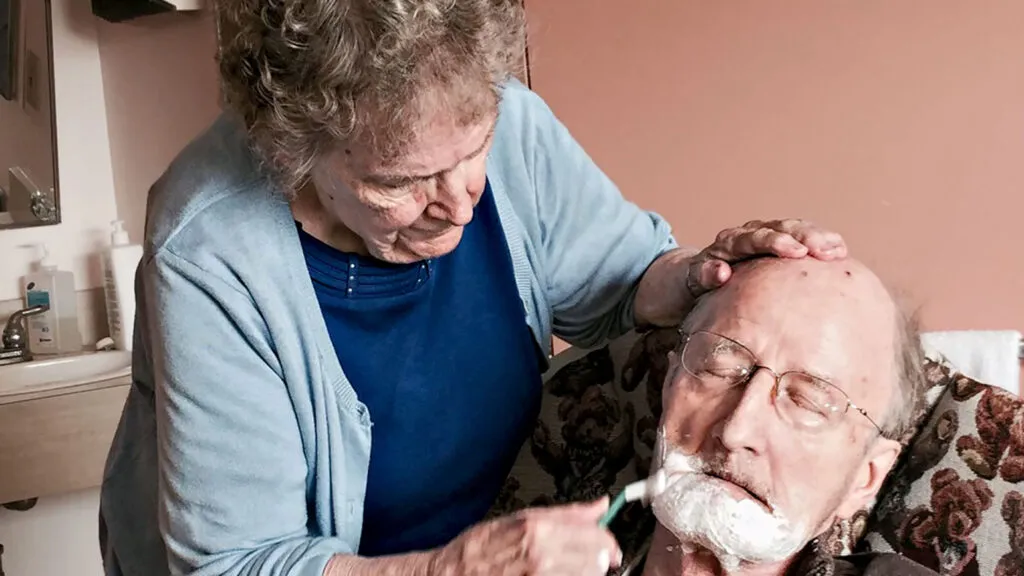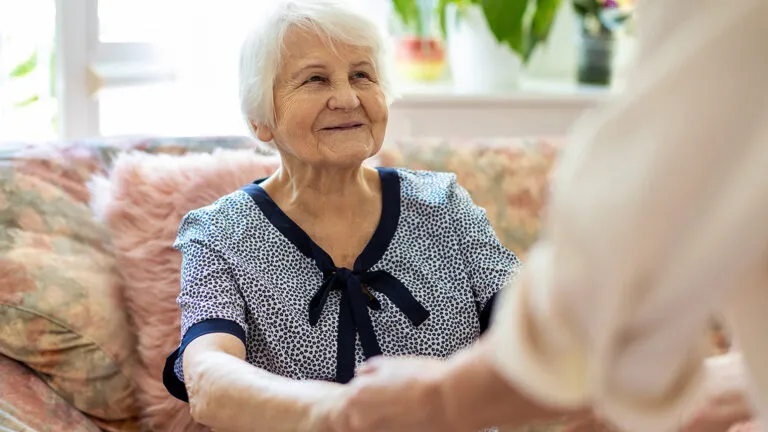I walked into the living room of our townhouse just as my 87-year-old husband, Hans, grumbled a string of words. “I can’t understand you,” I said, keeping my voice steady. He was speaking German again. Hans scowled.
“Use at least one English word so I’ll know what subject we’re on,” I said.
Hans spoke perfect English. We lived outside Montreal, in Quebec, Canada. But as his Alzheimer’s progressed, he increasingly reverted to the language he’d grown up speaking in his native Germany. Sometimes, it seemed as if he did it just to spite me. I didn’t know a word of German. One time I’d tried taping cards with German words onto various objects in the house, but I never got the hang of it.
When Hans did speak English, he used it to insult me. “Don’t touch those,” he snapped one night as I stood in front of the bedroom window, closing the blinds for the evening. “You don’t know how to use them. You’ll break them.” Did he really think I couldn’t operate a simple pull cord? I tried not to let my hurt show.
Of course, it wasn’t always this way. Both widowed, we’d been married for 14 years. Hans was an attentive and thoughtful husband. “Angel,” he’d say, using his pet name for me. “Let’s take a ride in the country.” We’d drive across the border into northern New York to take in the magnificent view from the top of Whiteface Mountain.
I never saw Hans look so peaceful and content as when he was gazing out at that wide, blue sky. Sometimes he’d take my hand in his, his grip strong and warm. I felt so safe and so loved.
Now he complained about everything I did. One thing in particular seemed to enrage him: when I went to church. “Brainwashing,” he called it. He said prayer was pointless. An academic man and scientist, he wanted proof. But I wasn’t about to give up my faith—God had seen me through plenty of hardships, and I needed him now more than ever. I needed God to help care for Hans.
Why had I married a man without faith? Because Hans and I were in love. A deep, mature love that sometimes comes in a late-in-life marriage. I believed that God would not have led me to Hans if he hadn’t meant for us to be together. I believed that even now.
Yet why did Hans turn against me when I was the one taking care of him? I cooked his meals. I suggested jigsaw puzzles and played his favorite music. Nothing cheered him. He would just bark at me in German.
I joined a support group for spouses of Alzheimer’s patients. I learned that people with Alzheimer’s tend to live in the past. One night, Hans woke up frantic, eyes wide. “They’re up there with guns, and they’re going to shoot us,” he said, pointing at an empty corner.
“No one is here, Hans,” I said. “You are safe.” Hans had served in World War II when he was just 18, then been held in a Russian prisoner-of-war camp under the harshest conditions. He’d made a harrowing escape, but the trauma of the terrible experience stayed with him for the rest of his life. After that night, Hans lapsed into German more. Every cold, sharp word made me feel like a failure as his caregiver.
Hans was failing physically too. He’d stumble and fall. One chilly afternoon, I helped settle him into his reclining chair, tucking a fleece blanket around him. I looked into his eyes, eyes that used to shine with love but now looked so lost. I tried to remember the man I’d married. He seemed so far away now. I choked back tears—I was lonely, angry, hurt and scared.
“Let me get your slippers,” I said and went upstairs to find them. They weren’t on the rug or by the nightstand. I knelt down to dig through the pile of things on the closet floor. Where could they be? Reaching way to the back, my hand hit something hard. It felt like a book. I pulled it out and examined the cover, old and worn. I mouthed the words: Das Neue Testament…Jesu Christi.
I didn’t need to speak German to know what that meant: a New Testament. I was shocked; I never knew Hans had a Bible. Did he once have faith? Did he still on some level? I sat there on the closet floor, opened the cover and turned the pages. On one side was German, and on the other, English.
Something touched my heart as strongly and clearly as if the words were spoken aloud: God communicates in all languages. God can bridge any barrier. I walked back downstairs carrying the Bible, the slippers forgotten and a new hope growing inside me.
I sat on the ottoman by my husband and showed him the Bible. “Hans, I know you’re anxious and confused,” I said. “But God is here with us. He won’t leave us.” Did Hans understand? He reached out and touched the Bible. I began to pray aloud beside him. I asked God to give him comfort in these difficult times. I thanked him for his love.
Did Hans even know what I was saying? I closed my eyes. That’s when I felt it. A gentle but firm touch. I looked down to see Hans squeezing my hand, warm and reassuring.
Everything I needed to know surrounded me in that moment. We might not always have the right words, but the language of love and trust is clear. Hans still loved me, and God loved us both.
For more inspiring stories, subscribe to Guideposts magazine.





